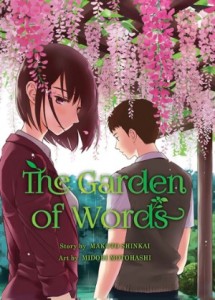By Makoto Shinkai and Midori Motohashi. Released in Japan by Kodansha, serialized in the magazine Afternoon. Released in North America by Vertical Comics.
I don’t really watch a lot of anime, but I know enough by osmosis that I am aware that the words ‘Makoto Shinkai’ and ‘bittersweet’ go together extremely well. I also recall the manga version of Five Centimeters Per Second, which lived up to that description very well. Now Vertical is releasing The Garden of Words, another by the same author. It’s still pretty riddled with emotion and emotional turmoil, but the good news is that there is a more optimistic ending that makes you think things might actually work out for the couple on the cover, even if several people might be skeeved a little by the May-August romance going on within the book.
Our hero is Takao, a young high school student who has dreams of being a shoemaker, but finds himself frustrated as he’s trying to do this self-taught, and still is not as good as he wants to be. He skips school whenever it’s raining and goes to a public gazebo to sketch people’s shoes. I like him. His frustration rings very true, and we can also see how he wants to try to help Yukari as well but is uncertain how to, so it just comes out as emotional turmoil. He also falls for her pretty fast, even though she’s clearly older than she is – he assumes that she is an office lady.
One of the more interesting things about this title is that it has some reverse bullying. Takao seems to get on fairly well with his fellow students. When we get the flashbacks that show us what led Yukino to her depressed current existence, though, we see that it was a case of the students bullying a young teacher. The girls in her class think she’s being too friendly with the boys, so begin to simply skip, and the rest of the class then joins in. The few remaining blame the teacher for the poorer instruction they receive as a result. And so Yukino quits, and we see in the scenes in her tiny apartment that she’s had tremendous trouble moving forward in life, to the point where she goes to the aforementioned gazebo just to drink.
But she and Takao have a strong bond, at first over poetry, and then because they seem to want to understand each other. I like that the poetry used was one of those quotes where you have to find the proper response, as it allows the whole thing to go full circle towards the end. I was a bit less happy with the way things did turn romantic – there’s nothing untoward here, but Takao does say he’s in love with Yukino, and the epilogue hints he’ll seek her out after he graduates from shoemaking school. The artist even shows off the discomfort of this by including a picture of a 20-year-old Yukino holding hands with an 8-year-old Takao in the extras. Teacher/student romance stories are far more popular in Japan than they are here, where anime fans still can’t say the words “Na-chan” without risking a fight.
Overall, however, this is exactly what you want from a Makoto Shinkai story, and the fact that it’s slightly happier and open ended also helps. And at one volume, it would also be a good present for someone who may have seen the film it’s based on.

